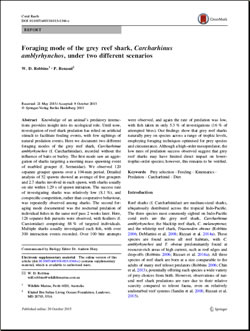Foraging mode of the grey reef shark, Carcharhinus amblyrhynchos, under two different scenarios
(2016)
This article on the foraging mode of the gray reef shark published in Coral Reefs journal was a result of research conducted by William Robbins and Capt. Phil Renaud during the Global Reef Expedition missions to French Polynesia.
Foraging mode of the grey reef shark, Carcharhinus amblyrhynchos, under two different scenarios
Coral Reefs 35: 253-260
February 22, 2016
By W.D. Robbins and Capt. Phil Renaud
Abstract
 Knowledge of an animal’s predatory interactions provides insight into its ecological role. Until now, investigation of reef shark predation has relied on artificial stimuli to facilitate feeding events, with few sightings of natural predation events. Here we document two different foraging modes of the grey reef shark, Carcharhinus amblyrhynchos (f. Carcharhinidae), recorded without the influence of baits or burley. The first mode saw an aggregation of sharks targeting a morning mass spawning event of marbled grouper (f. Serranidae). We observed 120 separate grouper spawns over a 104-min period. Detailed analysis of 52 spawns showed an average of five groupers and 2.7 sharks involved in each spawn, with sharks usually on site within 1.29 s of spawn initiation. The success rate of investigating sharks was relatively low (8.1 %), and conspecific competition, rather than cooperative behaviour, was repeatedly observed among sharks. The second foraging mode documented was the nocturnal predation of individual fishes in the same reef pass 2 weeks later. Here, 128 separate fish pursuits were observed, with fusiliers (f. Caesionidae) comprising 88 % of targeted individuals. Multiple sharks usually investigated each fish, with over 300 interaction events recorded. Over 100 bite attempts were observed, and again the rate of predation was low, with fish taken in only 5.3 % of investigations (16 % of attempted bites). Our findings show that grey reef sharks naturally prey on species across a range of trophic levels, employing foraging techniques optimised for prey species and circumstance. Although a high-order mesopredator, the low rates of predation success observed suggest that grey reef sharks may have limited direct impact on lower-trophic-order species; however, this remains to be verified…
Knowledge of an animal’s predatory interactions provides insight into its ecological role. Until now, investigation of reef shark predation has relied on artificial stimuli to facilitate feeding events, with few sightings of natural predation events. Here we document two different foraging modes of the grey reef shark, Carcharhinus amblyrhynchos (f. Carcharhinidae), recorded without the influence of baits or burley. The first mode saw an aggregation of sharks targeting a morning mass spawning event of marbled grouper (f. Serranidae). We observed 120 separate grouper spawns over a 104-min period. Detailed analysis of 52 spawns showed an average of five groupers and 2.7 sharks involved in each spawn, with sharks usually on site within 1.29 s of spawn initiation. The success rate of investigating sharks was relatively low (8.1 %), and conspecific competition, rather than cooperative behaviour, was repeatedly observed among sharks. The second foraging mode documented was the nocturnal predation of individual fishes in the same reef pass 2 weeks later. Here, 128 separate fish pursuits were observed, with fusiliers (f. Caesionidae) comprising 88 % of targeted individuals. Multiple sharks usually investigated each fish, with over 300 interaction events recorded. Over 100 bite attempts were observed, and again the rate of predation was low, with fish taken in only 5.3 % of investigations (16 % of attempted bites). Our findings show that grey reef sharks naturally prey on species across a range of trophic levels, employing foraging techniques optimised for prey species and circumstance. Although a high-order mesopredator, the low rates of predation success observed suggest that grey reef sharks may have limited direct impact on lower-trophic-order species; however, this remains to be verified…
